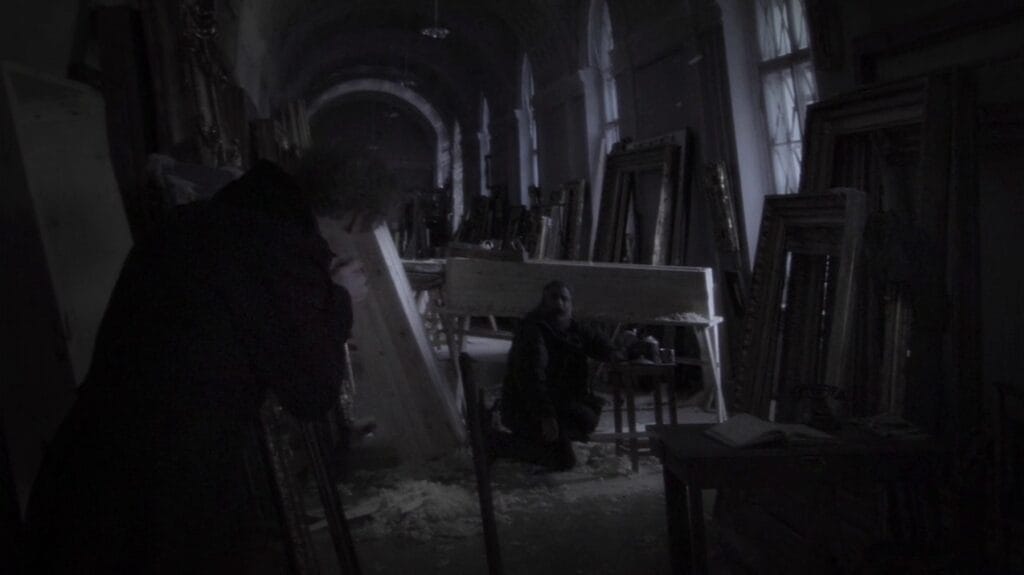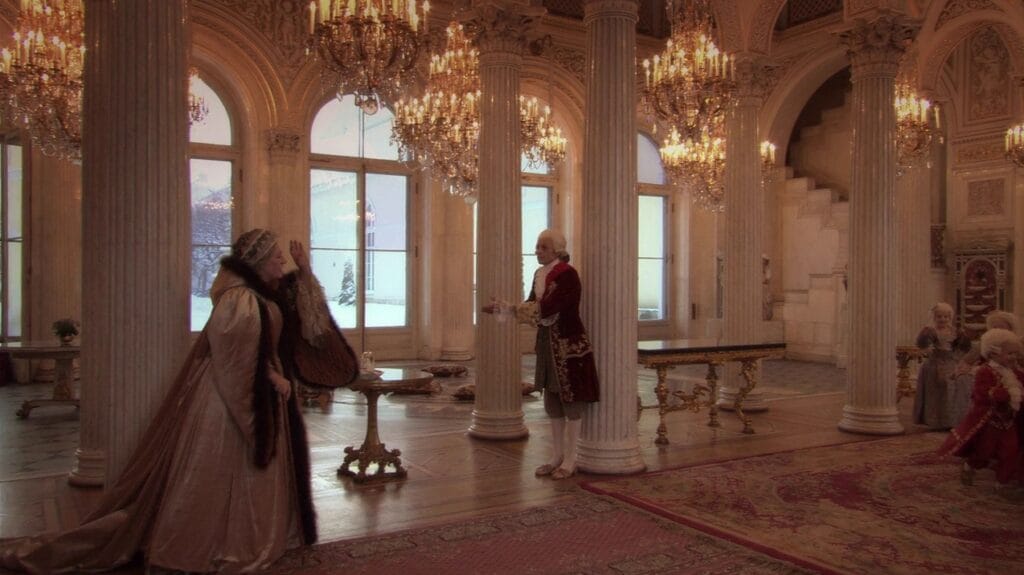Alexander Sokurov is known for making ‘slow’ films – a style which is exemplified by Russian Ark (Sokurov, 2002), as it was filmed entirely in one take with no camera cuts. Ira Jaffe explains the concept of slow cinema:
There are often moments in Russian Ark where very little is happening on-screen. This is because each scene is expertly timed to not only allow for the next one to be set up, but for the audience to process the information from the previous scene whilst viewing the artwork being featured at that moment in time. The majority of the film features artwork closely related to Catherine II and various Tzars/emperors. However, as the film progresses, it becomes clearer that Soviet History has been largely excluded – Jeremi Szaniawski (2014, p. 168) notes that: “The film, however, obliterates almost entirely the Soviet period”.
There is, however, one brief scene featuring Soviet history. The Stranger (Sergey Dreyden) opens a door, but is warned not to by the narrator (Sokurov). This door acts as a window to Leningrad, 1942.
(David Erdody, 2022)
The Narrator explains to The Stranger how during the war the Germans surrounded Leningrad and more than a million citizens died, mostly from starvation. The scene is dark and cold – The Stranger’s eagerness to explore is quickly overcome with fear as he notices the artwork is missing and the man in the room is crafting his own coffin. Just as they get into the room, they are hurried out and back into the warmth of the brightly lit and colourful hallways. The Stranger’s attention quickly changes to the Russian Tzars and he compliments their sense of taste for the architecture and artwork.
The impression given is that Sokurov feels that the Siege of Leningrad was too important to exclude from the film, but he wanted to move on quickly having covered it. The colours we see in this scene, which are few, are cold and dark – it shifts almost entirely to black and white, acting as a powerful way to represent 1942. This is a representation of the struggles the citizens of Leningrad faced during the war.


During the Soviet era it was very difficult to publicly criticize the Soviet Union without repercussion, so this scene is directly opposing those standards – Sokurov is critical of and ignores Soviet history, because he can. It is not his primary focus, as we know from his fascination with art.
In The Calvert Journal (Gray, 2015) Sokurov stated:
Throughout the many different rooms of artwork we see in the film, there is no Russian or Soviet artwork on display. The Winter Palace was created by the Tzarist regime and hosts European art and culture. Sokurov was able to specifically choose which artwork to highlight in the film and is in a way expressing how the Soviet Russia era is less important to be remembered than the other eras and by including the Leningrad scene he is stating that the loss of so many civilians during the Siege of Leningrad is too important to be forgotten.
- [Catherine the Great watches children play]. (n.d.). Retrieved 15 January 2025, from https://www.imdb.com/title/tt0318034/mediaviewer/rm875069441
- David Erdody. (2022, Jan 3). Leningrad 1942 [Video]. YouTube. https://youtu.be/T2rBbLZVAfg
- Gray, C. (2015). War paint: Francofonia director Alexander Sokurov talks art and power. The Calvert Journal. https://www.calvertjournal.com/articles/show/4695/sokurov-interview-Francofonia-venice
- Jaffe, I. (2014). Slow movies: Countering the cinema of action. ProQuest Ebook.
- [Russian Ark Poster]. (n.d.). Retrieved 15 January 2025, from https://www.imdb.com/title/tt0318034/mediaviewer/rm918462208
- Sokurov, A. (Director). (2002). Russian Ark [Film]. The State Hermitage Museum.
- Szaniawski, J. (2014). The cinema of Alexander Sokurov: Figures of paradox. ProQuest Ebook.
- [The Stranger opens a door to Leningrad 1942]. (n.d.). Retrieved 15 January 2025, from https://www.imdb.com/title/tt0318034/mediaviewer/rm908623873
APA7
Cable, J. (2025, Jan 21). How is Sokurov rejecting Soviet Film or History?. JCableMedia.com. [permalink].
Chicago
Cable, John. “How is Sokurov rejecting Soviet Film or History?.” JCableMedia.com. January 21, 2025. [permalink].
Harvard
Cable, J. (2025). How is Sokurov rejecting Soviet Film or History?. Available at: [permalink] (Accessed: 11 February 2026).